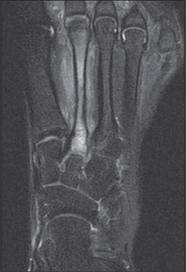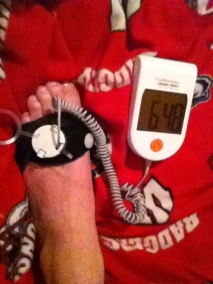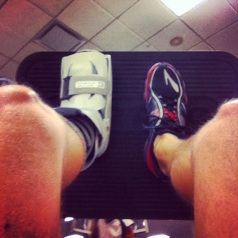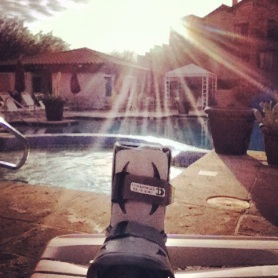There’s no easy way to put it. Dealing with an injury sucks. Especially when you are training for an event such as IRONMAN.
Backstory: I am training for IRONMAN Coeur d’Alene which is in June of this year. I signed up for a spring marathon to try and qualify for the 2015 Boston Marathon. Long story short, I was diagnosed with a stress reaction in my 3rd metatarsal. A stress reaction is the precursor to a stress fracture, when the bone is very weak and agitated. Im out 4-6 weeks from running, but I’m motivated to make it back stronger and better then ever.
I recently read an article on Active.com about dealing with an injury. Based off the article here are the 5 stages of overcoming an injury along with my experience and narratives dealing with each stage.
Stage 1: Denial.
Listen to your body. At the first sign of a potential injury, be smart and back off
My training was going great! I was all bundled up to do my 2nd 20-miler out on the snowy bike trails of Madison, WI. I was about 7 miles in when I had a sharp pain in my foot. This pain quicky increased over a 1/2 mile stretch to the point where even walking on my foot caused severe pain. After a few days of hobbling around I went to a Chiropractic/Running Specialist. They diagnosed it as muscle soreness and inflammation between the bones of my metatarsals. Over the course of the next 2 weeks I tried to run on it a few times, at one point doing a 10 miler with sharp pain almost the whole time. I was in denial. Finally I got an MRI and was diagnosed with a stress reaction. Sentenced to 4-6 weeks in a walking boot with crutches for the first week or so.
Stage 2: Anger.
Be angry for a few days, then look forward. Set rehab goals so you can celebrate small successes.
My marathon was 2 weeks away and I didn’t want to admit to myself I was going to miss it. I wanted to qualify for Boston so bad which I knew could do if only I was healthy. I became upset. Upset at my foot, upset at the first doctors who mis-diagnosed my injury, upset with people trying to support me, just upset at the world. It took me awhile to get over my anger, it wasn’t until even the day before my marathon that I finally admitted it wasn’t possible to run.
Stage 3: Bargaining.
Taking action to fix your problem is good, but don’t go overboard.
I didn’t want to waste any of my fitness with my foot being injured, so in the first few weeks on my injury I was trying to compensate my lack of running by doing workouts on the elliptical. There was pain at times, which was a sign I shouldn’t continue. I was trying too hard to fix my problem. Rest was going to be the key. My coach and I started to develop a plan to take my training in a new direction. Our plan was to hammer the bike and the swim (which luckily I was still able to do with no pain). I’ve taken steps to help the process heal faster. These include eating a more protein rich diet, taking supplements (Vitamin D and Calcium), using a bone stimulator (thank you so much Kendra!), and staying off my foot as much as possible.
Stage 4: Depression.
Fill your newfound downtime with other activities that help fill the void of running. Schedule time consuming sports you enjoy but can’t fit in when you’re training.
Not being able to run really put me into a funk. I lost motivation for a lot of other things in my life. I would rather lay around and feel sorry for myself than do anything else. Running gives me such a rush of emotions and a high after completing hard and intense workouts. I missed that feeling. I’ve learned that I need to stay active and involve myself with other people. I’ve started to take advantage of my extra free time by trying to make more plans with friends, work more, and get things done around the house. Finding new hobbies or activities is a great way to keep your mind off the injury.
Stage 5: Acceptance.
Coming to this mindset is critical to recovery. Research shows a direct relationship between stress and injury. Anxiety can cause muscle tension and suppress immune function, which can delay how quickly you get better. In this stage, you have a peaceful mindset that encourages healing.
I’ve fully accepting my injury. I am trying to remain as positive about the situation as possible. For example, this injury has allowed to me focus a ton on the bike. If I would have run the marathon, my legs would have not fully recovered for 3-4 weeks anyways. This injury has given me the chance to really step up my game on the bike and impress some people on race day. Having positive support in your life is crucial as well. I am blessed to have great friends, family and a supportive girlfriend to keep me going.
Some people may read this post and not understand how a small injury like this could have such an impact on someone, but I think if you are really invested in the sport or have a passion like I do, this may ring true to some. Here’s to hoping for a quick recovery! Thank you all for reading and I’m excited to get back out on the trails in a few weeks!
Also, huge congrats to my girlfriend on running her first half marathon! 1:46 and change. Awesome job.







I haven’t quite made it to step 5 with my calf strain yet, but slowly getting there. I hope the rest of your recovery goes smoothly. See you in Coeur d’Alene!
Sorry to hear about your injury! Some fractures break opportunities, other opportunities are born of fractures… http://chitoandkgo.com/2013/08/30/fractured-opportunity-or-opportunity-born-of-fractures/
Sending healing vibes!
I’m sorry to hear you are injured and temporarily sidelined at least for running. Keep doing all you can and what the doctors/physical therapists say and the time will fly by. Soon you will be healed up and crossing the finish line at IRONMAN Coeur d’Alene 🙂
I have been injured ..calf pull, knee pain….for about 15 months. Have been doing this for (marathons, triathlons) for almost 30 years now and always could just ease up a little and get on through it. Not this time. The Ironman training actually has worsened the injury and I got where walking was a problem…I dropped out and took some serious, complete time off. The leg is getting better a little at a time. The adventure will be starting over again after all this time. No more ironman event in my future though.
http://milesofthejourney.blogspot.com/
Pingback: Calf Strain = No Gain | The Journey to 140.6·